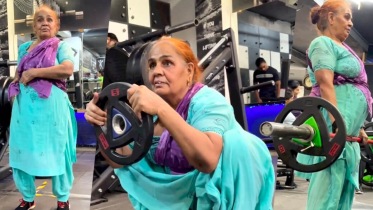Roshni Devi Sangwan, a 70-year-old weightlifter, has gained widespread attention for her workout videos. She recently shared details of her diet on a podcast with the well-known content creator Ranveer Allahabadia.
“I have oats with 10 almonds and raisins in a drink. At lunch, I have a little bit of rice, dal, salad, and curd. In the evenings, I have a single soaked moong chilla with paneer and 1-2 green chillies. I drink one glass of milk after that. This is what I eat. Apart from these, I don’t eat anything else, ” shared Roshni.
The senior citizen — who goes by @mummyweightlifter on Instagram — had gotten involved in the sport towards the latter half of her life after being encouraged by her son Ajay Sangwan.
Decoding the viral weightlifter’s diet
Dr. Gulnaaz Shaikh, chief dietitian at KIMS Hospitals, Thane, praised the internet sensation’s diet. The doctor further remarked that she found it ‘refreshing’ to see a diet based on Indian home cooking. She further explained that “This plan, featuring dal, rice, curd, oats, almonds, moong chilla, and paneer, provides a great mix of complex carbs, protein, healthy fats, and fibre.”
Shaikh highlighted the benefits of consuming various ingredients mentioned in this diverse palette.
“This form of consumption enhances gut health and stabilises blood sugar. Moreover, components such as moong, almonds, and paneer serve as excellent vegetarian protein sources, aiding metabolism and muscle repair,” she added.
Is this diet for everyone? Important Considerations
While praising the diet’s healthy components, Dr. Shaikh stated that almost no diet can be universally recommended for everyone to follow. She further explained that components like portion control and nutrient balance play a crucial role in determining an ideal diet for an individual.
For instance, while protein-rich foods such as nuts and paneer are beneficial, their high-calorie content might not be suitable for everyone. Dr. Shaikh also pointed out that this diet would require a lot of adjustments for people with specific conditions such as lactose intolerance, PCOD, or diabetes.
Personalised Nutrition: One Size Does Not Fit All
While the dietitian accepted this diet as a valuable starting point for a healthy adult, she warned that individual nutritional needs vary, meaning the same diet would not be equally beneficial for everyone.
She suggested that individuals with insulin resistance or thyroid issues would require increased protein and fewer carbohydrates. Dr. Shaikh strongly advised individuals with chronic conditions to consult a dietitian before adopting dietary changes based on online information.
“While a simple Indian meal can be fulfilling in its way, it might now work for everyone. Nutrition is personal. A plate that works well for one person may not be suitable for another,” she added.
She advised people to be aware of changes to their diet and to seek professional medical advice when necessary. “The ideal diet is one that you can sustain and enjoy long-term, while feeling energetic, light, and healthy.”
